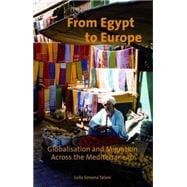
What is included with this book?
Simona Talani is a Lecturer In European Political Economy at the University of Bath, and a Research fellow at the London School of Economics.
| Acknowledgements | p. viii |
| List of Illustrations | p. ix |
| Introduction | p. 1 |
| Migration in theory: The state of the debate or the State in the debate | p. 9 |
| Introduction | p. 9 |
| What is International Political Economy? | p. 10 |
| Mainstream versus critical IPB approaches to migration: The State in the debate | p. 18 |
| The political economy of immigration in the realist tradition | p. 18 |
| Liberal institutionalism and migration | p. 21 |
| The globalisation thesis: An introduction | p. 25 |
| The globalisation thesis within the globalisation debate | p. 28 |
| Introduction | p. 28 |
| A qualitative definition of globalisation | p. 28 |
| Globalisation and the State | p. 30 |
| Realist approaches: The globalisation myth and the centrality of the State | p. 30 |
| Neo-institutionalist approaches: The transformation of the nation state in the global economy | p. 34 |
| Ttansnationalist approaches: The subordination of politics to economics | p. 38 |
| The new global division of labour and the increase of mass migration | p. 40 |
| Conclusion | p. 43 |
| Fortress Europe | p. 45 |
| Introduction | p. 45 |
| The evolution of 'Fortress Europe' | p. 46 |
| EV immigration models | p. 58 |
| Conclusion | p. 62 |
| Migration in practice: Egyptians did not emigrate! | p. 64 |
| Introduction | p. 64 |
| The policy of the Egyptian government | p. 64 |
| Egypt's migration dynamics | p. 67 |
| Egyptian migration today | p. 70 |
| Mapping the routes | p. 79 |
| The Spanish route | p. 79 |
| The Libyan route | p. 82 |
| The Turkish route | p. 86 |
| The Sarajevo route | p. 87 |
| Egypt as a transit country | p. 89 |
| Conclusion | p. 89 |
| Why do Egyptians migrate now?: The lack of integration in the MENA region | p. 90 |
| Introduction | p. 90 |
| The institutional steps towards more economic integration in the MENA region | p. 91 |
| Actual economic integration in the MENA region | p. 96 |
| Intraregional trade integration | p. 96 |
| Inter-Arab aid capital flows | p. 104 |
| Conclusion | p. 110 |
| Why do Egyptians migrate now?: The marginalization of Egypt | p. 113 |
| Introduction | p. 113 |
| Steps towards an open and stable economy | p. 113 |
| The marginalisation of Egypt | p. 119 |
| Economic marginalisation | p. 119 |
| Other indicators of marginalisation | p. 132 |
| Conclusion | p. 136 |
| Who is the Egyptian migrant? | p. 137 |
| Introduction | p. 137 |
| The profile of the Egyptian migrant: The 'homo economicus' | p. 140 |
| The profile of the Moroccan migrant: From the homo economicus to the community-formation phase | p. 147 |
| Conclusion | p. 153 |
| What do Muslim migrants do in receiving countries? | p. 156 |
| Introduction | p. 156 |
| The integration of Muslim workers in the labour markets: General patterns in Europe | p. 157 |
| Egyptians abroad: brain drain or mass migration? | p. 179 |
| The insertion of migrants in the 'informal economy' and its consequences for receiving societies | p. 184 |
| Conclusion | p. 198 |
| 'Islamophobia' and social capital | p. 201 |
| Introduction | p. 201 |
| 'Muslim voices': The enemy within | p. 201 |
| Instances of 'Islamophobia' before September 11 | p. 208 |
| What is social capital? | p. 219 |
| The consequences of the lack of social capital among immigrant Muslim communities: the case of France | p. 223 |
| Conclusion | p. 230 |
| Conclusion | p. 232 |
| Notes | p. 237 |
| Reference | p. 255 |
| Index | p. 270 |
| Table of Contents provided by Ingram. All Rights Reserved. |
The New copy of this book will include any supplemental materials advertised. Please check the title of the book to determine if it should include any access cards, study guides, lab manuals, CDs, etc.
The Used, Rental and eBook copies of this book are not guaranteed to include any supplemental materials. Typically, only the book itself is included. This is true even if the title states it includes any access cards, study guides, lab manuals, CDs, etc.